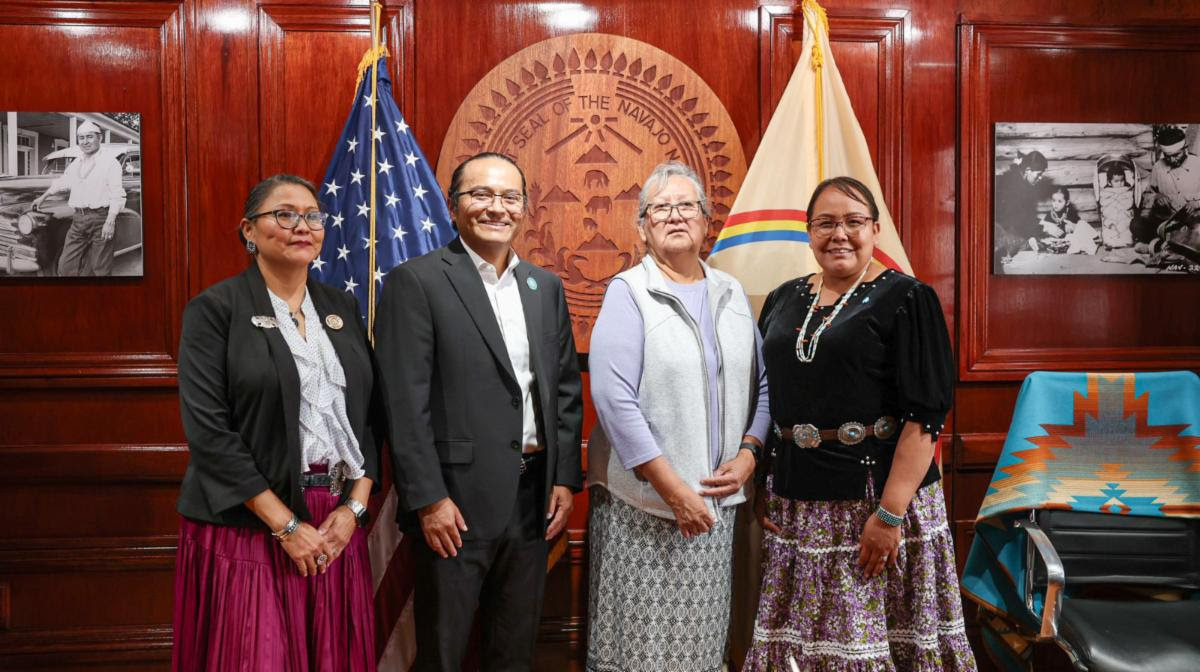
- Details
- By Native News Online Staff
On Thursday, July 3, 2025, Navajo Nation President Buu Nygren, 25th Navajo Nation Council Speaker Crystalyne Curley, and Law and Order Committee Chair Eugenia Charles-Newton signed a joint letter formally recognizing Associate Justice Eleanor Shirley as the Interim Chief Justice of the Navajo Nation.
This decision follows a letter from the Legislative Branch regarding former Chief Justice JoAnn Jayne. The Law and Order Committee (LOC) unanimously passed a resolution declining to recommend Justice Jayne for permanent appointment as Chief Justice, as permitted under Navajo Nation law.'
After reviewing the committee’s recommendation, President Nygren chose not to appoint Justice Jayne to the permanent position. Consequently, Associate Justice Shirley will serve as Interim Chief Justice.
The leadership of the Navajo Nation expresses its gratitude to former Chief Justice JoAnn Jayne for her service, particularly during her two-year term as Probationary Chief Justice. With the conclusion of her probationary period, she is no longer serving on the Navajo Nation Supreme Court.
The Navajo Nation Judiciary is now accepting applications for the positions of Chief Justice and Associate Justice of the Navajo Nation Supreme Court. All eligible and qualified individuals are encouraged to apply. A strong and stable judiciary is essential to upholding justice, accountability, and the core values of the Diné people. These roles demand the highest standards of integrity, impartiality, and commitment to Navajo law and tradition.
Application Information:
-
Positions: Chief Justice and Associate Justice, Navajo Nation Supreme Court
-
Location: Window Rock, Arizona
-
Status: Open Until Filled
-
How to Apply: Submit applications to the Judicial Branch Human Resources Director
-
Contact: Judicial Branch Human Resources at (928) 797-1493 or visit www.courts.navajo-nsn.gov
More Stories Like This
NCAI Passes Two Emergency Resolutions on Immigration Enforcement ActivitiesChickasaw Lighthorse Police Officer named Indian Country Law Enforcement Officer of the Year
Indian Gaming Association Rallies Broad Coalition Against Sports Event Contracts It Calls Illegal Threat to Tribal Sovereignty
Navajo Resources and Development Committee Issues Notice on Livestock Inspection Requirements
American Prairie, Tribal Coalition Files Protest Over Rescinded Grazing Rights
Help us defend tribal sovereignty.
At Native News Online, our mission is rooted in telling the stories that strengthen sovereignty and uplift Indigenous voices — not just at year’s end, but every single day.
Because of your generosity last year, we were able to keep our reporters on the ground in tribal communities, at national gatherings and in the halls of Congress — covering the issues that matter most to Indian Country: sovereignty, culture, education, health and economic opportunity.
That support sustained us through a tough year in 2025. Now, as we look to the year ahead, we need your help right now to ensure warrior journalism remains strong — reporting that defends tribal sovereignty, amplifies Native truth, and holds power accountable.
 The stakes couldn't be higher. Your support keeps Native voices heard, Native stories told and Native sovereignty defended.
The stakes couldn't be higher. Your support keeps Native voices heard, Native stories told and Native sovereignty defended.
Stand with Warrior Journalism today.
Levi Rickert (Potawatomi), Editor & Publisher


